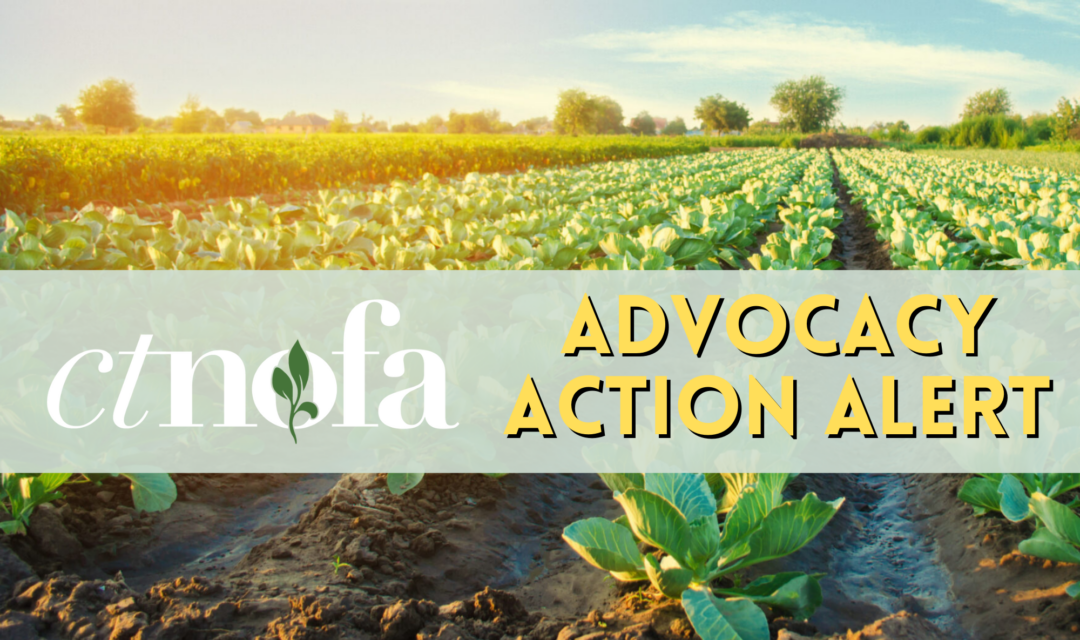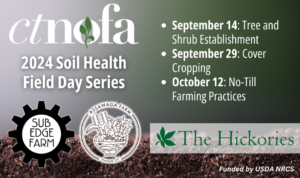CT NOFA Advocacy Update from Kimberly Stoner

CT NOFA at the State Capitol ⏤ Advocacy Update from Director of Advocacy, Dr. Kimberly Stoner
The legislative session is picking up steam. In my six weeks as your Director of Advocacy, I have focused on two main issues, and you can take action on these issues.
1. The Connecticut Environmental Rights Amendment, HJ 37, a Green Amendment to the state constitution that would put the rights of the people to clean air, water, and soil, a stable climate, and a healthy environment on the same level as the rights to free speech, freedom of religion, and free and open elections. This amendment would ensure that government decisions and actions put environmental protection, environmental justice, and prevention of pollution first, rather than permitting and management of pollution. It would also empower affected communities to advocate for their rights through the courts if the government infringes on their rights.
Action Item: Contact your legislators and ask them to co-sponsor and support HJ 37. An easy way to do this is to go to our Linktree, which can connect you with your legislator, and which can guide you to more information: https://linktr.ee/ctera.
For those who want to do more, there will be a public hearing in the Environment Committee on this resolution on Monday, Feb. 27 both in-person at the Capitol and on Zoom. If you want to testify or submit written testimony, you can find the links to do that at the top of the agenda for the public hearing here: https://cga.ct.gov/2023/envdata/pha/pdf/2023PHA00227-R001000ENV-PHA.PDF
This will be a long-term campaign. It takes a lot to amend the state constitution, so there will be more to do over the next couple of years. I will be presenting a workshop about this Green Amendment on March 7 at 7 pm as part of the CT NOFA Winter Conference.
2. An Act Concerning Neonicotinoids for Non-Agricultural Use, SB 963, which would ban neonicotinoids for use on lawns and landscapes. Several neonicotinoids are insecticides highly toxic to bees, that persist for up to a year in soil and for multiple years in trees, and that are water soluble, so they leach into groundwater, lakes, streams, and wetlands, and kill aquatic insects there. There is growing evidence of effects on other wildlife, too. In Connecticut, the group of neonicotinoids to which this law would apply are already restricted use pesticides, meaning that homeowners can’t buy them and apply them (unlike in many other states). There was a public hearing on this bill last week. I testified in favor of the bill, with some specific exceptions identified by my fellow scientists at the Experiment Station for saving trees like hemlocks and ashes from invasive insect pests that kill trees. These very targeted applications do not pose a risk of spread of the pesticide, and should be replaced over time as we find natural enemies for these invasive insects.
Action item: Contact your legislators and ask them to support SB 963 to stop the use of neonicotinoids on lawns and landscapes with only strictly limited exceptions.
Other bills of interest to CT NOFA members:
1. Strengthening Environmental Justice. A coalition led by Save the Sound has proposed changes to Connecticut’s environmental justice laws that would prohibit CT DEEP from giving permits to certain types of polluting facilities to be built in environmental justice communities that already have damaging cumulative effects from existing pollution. The legislation proposed by CT DEEP says that CT DEEP “may” stop those facilities, but not that it “shall.”
Action item: Contact your legislators and ask them to substitute the language from Save the Sound into the CT DEEP bill An Act Concerning Environmental Justice.
2. Permitting Local Butcher Shops to Process Farmer-Owned Livestock, SB 298. This bill would require the Commissioner of Agriculture to get funding from a Federal program to enable butcher shops in the state to serve as United States Department of Agriculture approved processors for local farmers. This would address the processing backlog at USDA facilities.
Action item: Contact your legislators to support SB 298. If you want to do more, this bill will be considered in the same public hearing in the Environment Committee on Monday, Feb. 27 along with the CT Environmental Rights Amendment. You can sign up through the agenda to testify or submit written testimony through the links at the top of the agenda here: https://cga.ct.gov/2023/envdata/pha/pdf/2023PHA00227-R001000ENV-PHA.PDF
There is so much opportunity to make Connecticut a more organic and healthier state!
-Dr. Kim Stoner, Director of Advocacy
Recent Posts
CT NOFA Announces 2024 Slate of Soil Health Field Days
Beginning in late summer, CT NOFA will host three field days centered on soil health…
Read MoreCT NOFA Board Member, Freedom Gerardo, Featured on New Hampshire Public Radio
CT NOFA board member, Hector “Freedom” Gerardo, was recently featured on New Hampshire Public Radio’s…
Read More

